外研版(2019)必修第三册Unit 6 Disaster and hope-Using language课件(39张ppt)
文档属性
| 名称 | 外研版(2019)必修第三册Unit 6 Disaster and hope-Using language课件(39张ppt) | 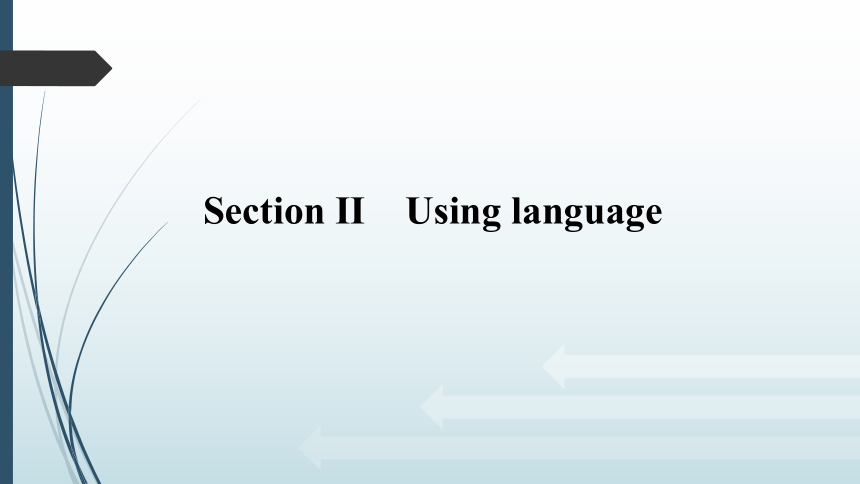 | |
| 格式 | zip | ||
| 文件大小 | 163.4KB | ||
| 资源类型 | 教案 | ||
| 版本资源 | 外研版(2019) | ||
| 科目 | 英语 | ||
| 更新时间 | 2021-12-29 14:40:29 | ||
图片预览

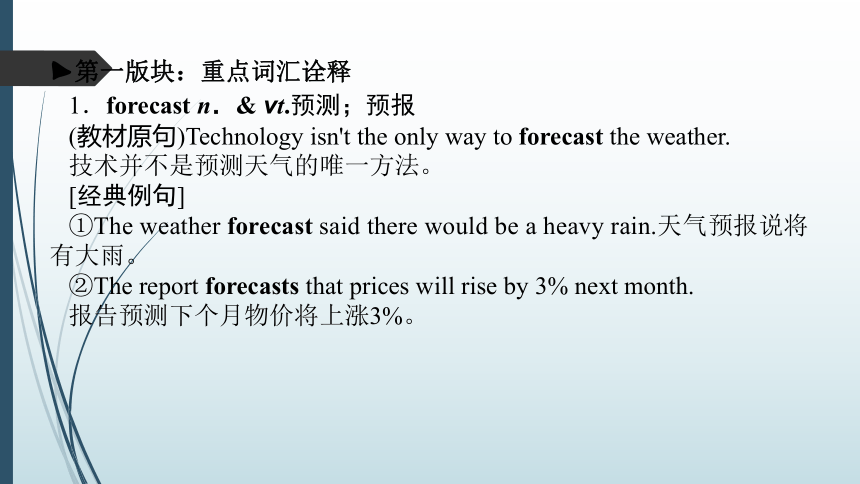
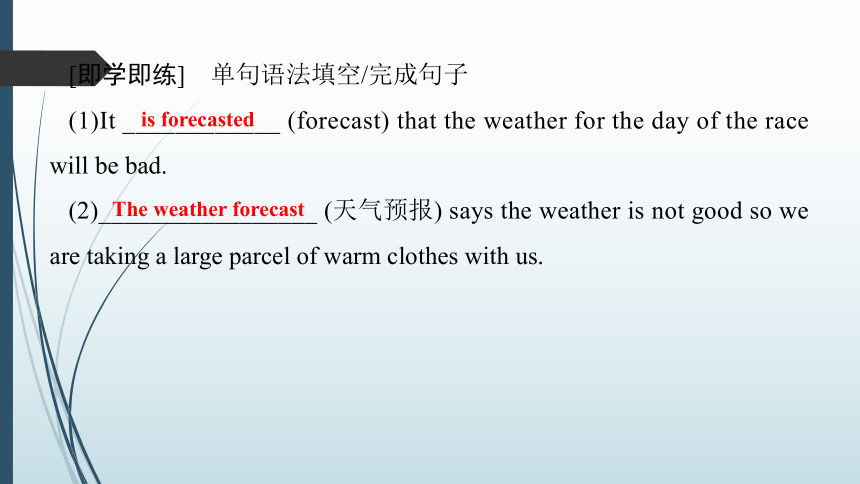
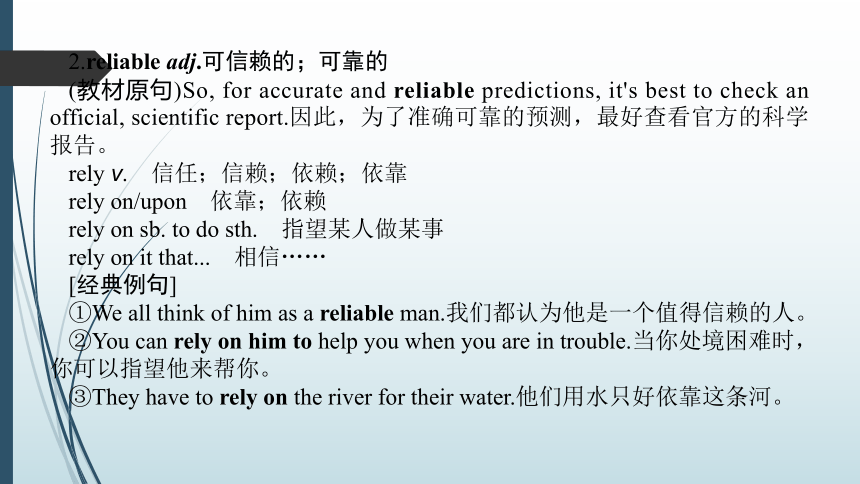
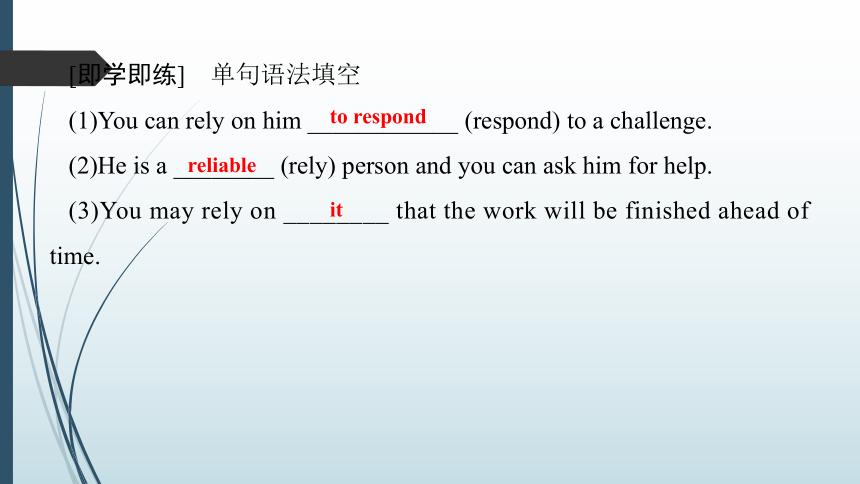
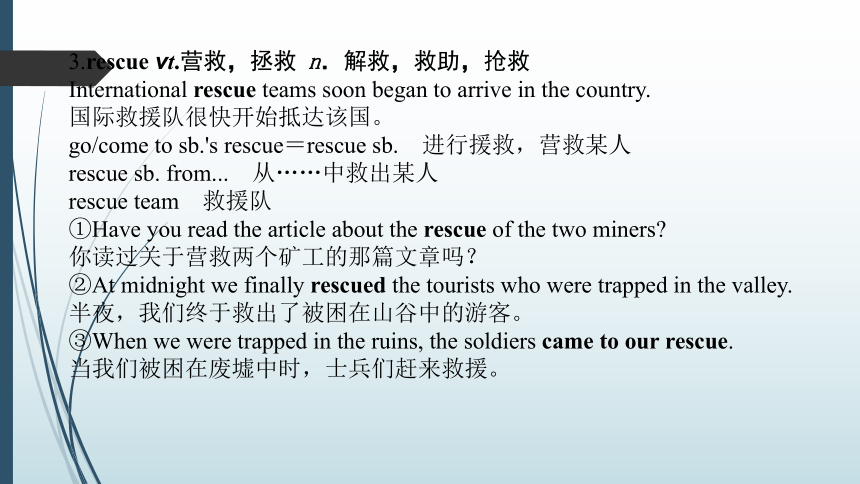
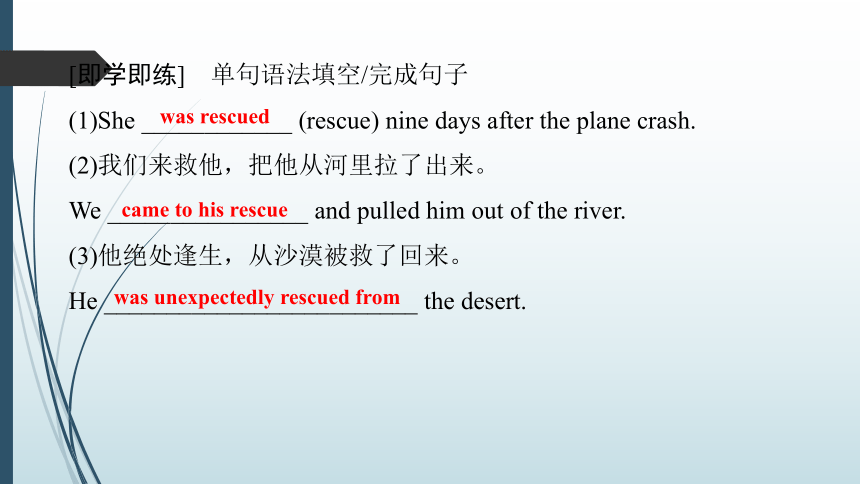
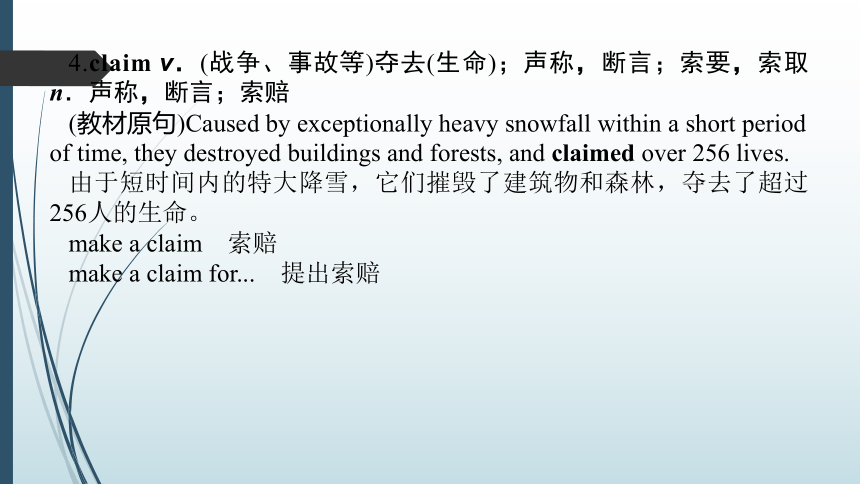
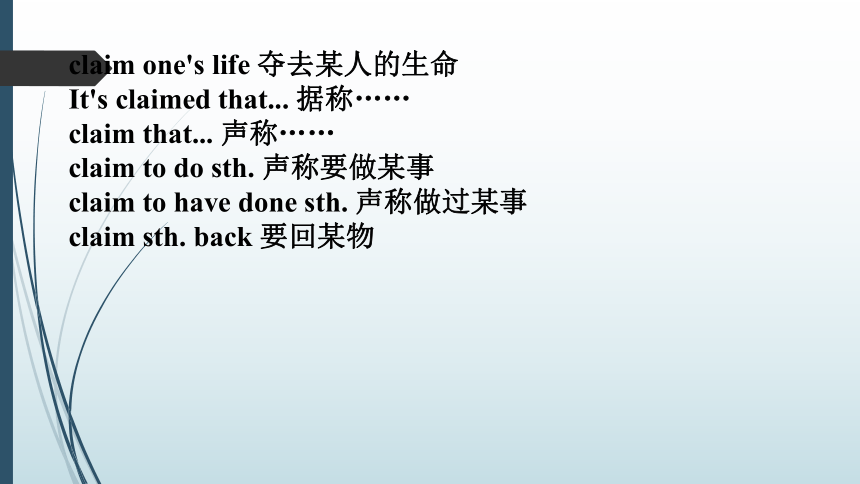
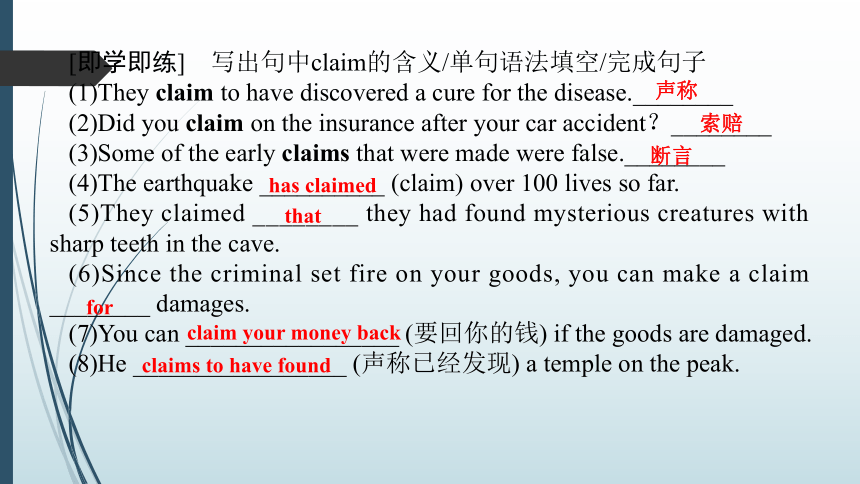
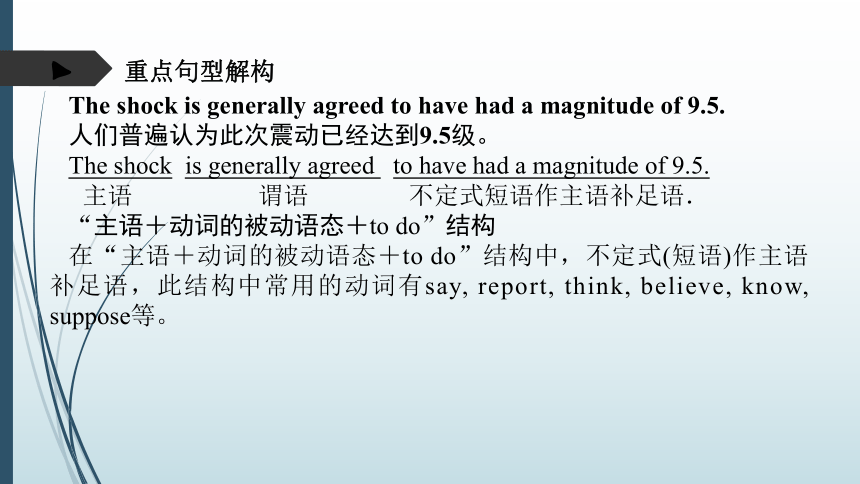
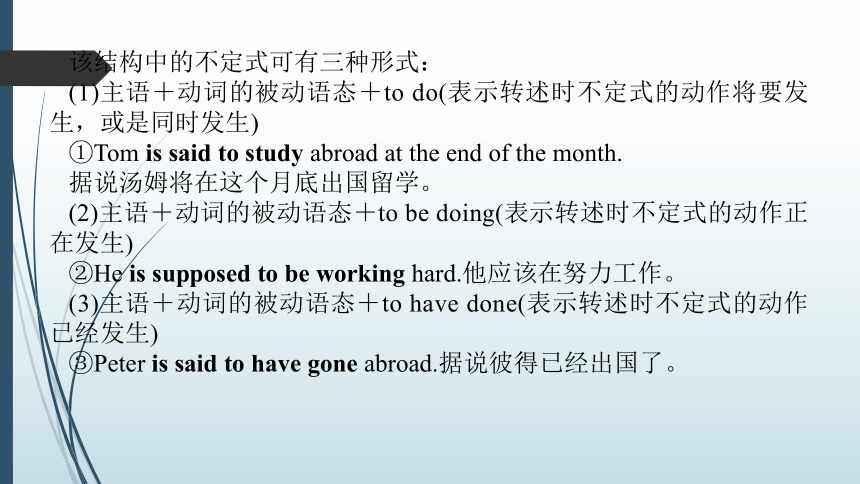
文档简介
(共39张PPT)
Section Ⅱ Using language
第一版块:重点词汇诠释
1.forecast n.& vt.预测;预报
(教材原句)Technology isn't the only way to forecast the weather.
技术并不是预测天气的唯一方法。
[经典例句]
①The weather forecast said there would be a heavy rain.天气预报说将有大雨。
②The report forecasts that prices will rise by 3% next month.
报告预测下个月物价将上涨3%。
[即学即练] 单句语法填空/完成句子
(1)It ____________ (forecast) that the weather for the day of the race will be bad.
(2)_________________ (天气预报) says the weather is not good so we are taking a large parcel of warm clothes with us.
is forecasted
The weather forecast
2.reliable adj.可信赖的;可靠的
(教材原句)So, for accurate and reliable predictions, it's best to check an official, scientific report.因此,为了准确可靠的预测,最好查看官方的科学报告。
rely v. 信任;信赖;依赖;依靠
rely on/upon 依靠;依赖
rely on sb. to do sth. 指望某人做某事
rely on it that... 相信……
[经典例句]
①We all think of him as a reliable man.我们都认为他是一个值得信赖的人。
②You can rely on him to help you when you are in trouble.当你处境困难时,你可以指望他来帮你。
③They have to rely on the river for their water.他们用水只好依靠这条河。
[即学即练] 单句语法填空
(1)You can rely on him ____________ (respond) to a challenge.
(2)He is a ________ (rely) person and you can ask him for help.
(3)You may rely on ________ that the work will be finished ahead of time.
to respond
reliable
it
3.rescue vt.营救,拯救 n.解救,救助,抢救
International rescue teams soon began to arrive in the country.
国际救援队很快开始抵达该国。
go/come to sb.'s rescue=rescue sb. 进行援救,营救某人
rescue sb. from... 从……中救出某人
rescue team 救援队
①Have you read the article about the rescue of the two miners
你读过关于营救两个矿工的那篇文章吗?
②At midnight we finally rescued the tourists who were trapped in the valley.
半夜,我们终于救出了被困在山谷中的游客。
③When we were trapped in the ruins, the soldiers came to our rescue.
当我们被困在废墟中时,士兵们赶来救援。
[即学即练] 单句语法填空/完成句子
(1)She ____________ (rescue) nine days after the plane crash.
(2)我们来救他,把他从河里拉了出来。
We ________________ and pulled him out of the river.
(3)他绝处逢生,从沙漠被救了回来。
He _________________________ the desert.
was rescued
came to his rescue
was unexpectedly rescued from
4.claim v.(战争、事故等)夺去(生命);声称,断言;索要,索取 n.声称,断言;索赔
(教材原句)Caused by exceptionally heavy snowfall within a short period of time, they destroyed buildings and forests, and claimed over 256 lives.
由于短时间内的特大降雪,它们摧毁了建筑物和森林,夺去了超过256人的生命。
make a claim 索赔
make a claim for... 提出索赔
claim one's life 夺去某人的生命
It's claimed that... 据称……
claim that... 声称……
claim to do sth. 声称要做某事
claim to have done sth. 声称做过某事
claim sth. back 要回某物
[即学即练] 写出句中claim的含义/单句语法填空/完成句子
(1)They claim to have discovered a cure for the disease.________
(2)Did you claim on the insurance after your car accident?________
(3)Some of the early claims that were made were false.________
(4)The earthquake __________ (claim) over 100 lives so far.
(5)They claimed ________ they had found mysterious creatures with sharp teeth in the cave.
(6)Since the criminal set fire on your goods, you can make a claim ________ damages.
(7)You can _________________ (要回你的钱) if the goods are damaged.
(8)He _________________ (声称已经发现) a temple on the peak.
声称
索赔
断言
has claimed
that
for
claim your money back
claims to have found
重点句型解构
The shock is generally agreed to have had a magnitude of 9.5.
人们普遍认为此次震动已经达到9.5级。
The shock is generally agreed to have had a magnitude of 9.5.
主语 谓语 不定式短语作主语补足语.
“主语+动词的被动语态+to do”结构
在“主语+动词的被动语态+to do”结构中,不定式(短语)作主语补足语,此结构中常用的动词有say, report, think, believe, know, suppose等。
该结构中的不定式可有三种形式:
(1)主语+动词的被动语态+to do(表示转述时不定式的动作将要发生,或是同时发生)
①Tom is said to study abroad at the end of the month.
据说汤姆将在这个月底出国留学。
(2)主语+动词的被动语态+to be doing(表示转述时不定式的动作正在发生)
②He is supposed to be working hard.他应该在努力工作。
(3)主语+动词的被动语态+to have done(表示转述时不定式的动作已经发生)
③Peter is said to have gone abroad.据说彼得已经出国了。
[即学即练] 完成句子
(1)据报道银行已经提前建成了。
The construction of the bank __________________________ in advance.
(2)节食被普遍认为是减轻体重的有效方式之一。
__________________________________________ one of the effective ways of losing weight.
(3)据说经理正在开会,我们在他办公室等他吧。
__________________________ a meeting, so let's wait at his office.
is reported to have been completed
Being/Going on a diet is generally believed/thought to be
The manager is said to be having
第三版块:语法——省略
为了避免重复,或为了使句子更加简练,在一些句子中常常省去一个或某几个成分,这种语法现象在英语中叫省略。
在英语句子中,常见的省略情况有以下几种:
一、简单句中的省略
1.省略主语:一般情况下,主语是不能省略的,但在祈使句和其他不容易引起歧义的情况下,特别是在口语中,主语常常省略。主要有:祈使句中的you和疑问句中的主语。
(You) Shut up!住嘴!
(You) Want a hand?需要帮忙吗?
(I) Beg your pardon.请再说一道。
(It) Doesn't matter.没关系。
2.省略宾语:当上、下或前后两个句子的宾语一致时,下句或后句常省略宾语。
—Do you know Miss Gao
—I don't know (her).
——你认识高女士吗?
——不认识。
3.省略主语和谓语(或谓语的一部分):在某些具体的场合下,主语和谓语都很明确,此时为了简化或显得亲切等,可将主语和谓语(或谓语的一部分)同时省略,只剩下表语、宾语、状语或其他成分。
(You come) This way, please.
请这边走。(省略了主语和谓语)
(Have you) Got any ink
你有墨水吗?(省略了主语和谓语的一部分)
补全下列省略句
①Have a seat, please!
___________________________________________________________
②Looks like rain.
___________________________________________________________
③Let's do the dishes. I'll wash and you dry.
___________________________________________________________
④Got any idea about the plan
___________________________________________________________
You have a seat, please!
It looks like rain.
Let's do the dishes. I'll wash and you dry them.
Have you got any idea about the plan
二、并列句中的省略
在由and或but连接的并列句中,常省略一些重复的词或词组。
1.省略主语或宾语:当后面主语或宾语与前面一部分相同时,可以省略后一部分中共同的主语或宾语。
Tom picked up a book on the floor and (Tom) handed it to his teacher.汤姆在地板上捡起了一本书并把它交给了老师。
2.省略系动词、助动词或情态动词:当主语不同,而谓语部分的系动词,助动词或情态动词相同,则省略后面的系动词、助动词或情态动词。
Jack must have been playing football and Mary (must have been) doing her homework.
杰克肯定一直在踢足球,玛丽肯定一直在做家庭作业。
3.省略主谓成分:当主语与谓语动词相同,则省略后面的主谓成分。
His advice made me happy, but (his advice made) Jim angry.
他的建议使我高兴,却使吉姆生气。
4.若主语不同,但主要动词及后续部分相同,则省略主要动词及后续部分。
He has a knowledge of first aid but his friend doesn't (have a knowledge of first aid).
他具备急救知识,但他朋友不具备。
[即学即练] 写出下列句中可以省略的部分
①Some of us study Japanese, and others study English.___________
②He gave up drinking several months, but he returned to his old way later.________
③My friend didn't come to school, but I wonder why he/she didn't come to school.______________________
第二个study
第二个he
he/she didn't come to school
三、复合句中的省略
1.状语从句的省略
(1)在when, while, if, as if, though, although, as, until, once, whether, unless, whenever等连接的状语从句中,当从句谓语中含有系动词be,且从句主语跟主句的主语相同或从句的主语为it时,则从句中主语和be动词常被省略。
Wood gives off much smoke while (it is) burning.
木头燃烧时产生很多烟。
Whenever it is) possible, they would stop him and ask him the three questions.
只要一有机会,他们就会拦住他并问他这三个问题。
Will you be free this Sunday If (it is) so, let's go camping.
这个周日你有空吗?如果有空,我们去野营吧。
When (it is) heated, ice can be turned into water.
冰在加热的时候可以变成水。
(1)单句语法填空
①When ________ (surf) the Internet, I downloaded the film.
②Video games can be a poor influence if ________ (leave) in the wrong hands.
③He opened his mouth as if ________ (say) something.
(2)把下列句子改为省略句
①If it is so, I hope you will have a wonderful time.
→________, I hope you will have a wonderful time.
②The winters in Hangzhou are not so mild as they are in Guangzhou.
→The winters in Hangzhou are not so mild ________________.
surfing
left
to say
If so
as in Guangzhou
2.定语从句的省略
(1)在限制性定语从句中,作宾语用的关系代词whom, which, that可省略(但whom, which紧跟在介词后时不能省略)。
The exact year (which/that) Angela and her family spent together in China was 2008.
安哥拉和她的家人一起在中国度过的那一年是2008年。
(2)修饰way的关系词that/in which可以省略。
The way he speaks to us is really annoying.
他对我们讲话的方式真是让人讨厌。
[即学即练] 写出下列句中可以省略的部分
①Among the many dangers which sailors have to face, probably the greatest of all is fog.________
②Please send us all the information that you have about the candidate for the position.________
which
that
3.宾语从句的省略
(1)及物动词后接宾语从句时,连接词that一般可以省略;但如果及物动词接两个或两个以上that引导的宾语从句,那么只有第一个that可以省略。
I truly believe that beauty comes from within.
我真的相信美丽来自内心。
He said that the text was very important and that we should learn it by heart.
他说这篇课文很重要,我们应该牢记在心。
(2)when, where, how和why引导的宾语从句有时可以仅保留引导词。
I know that a movie star will come to our city but I don't know when (he will come to our city).
我知道一个电影明星将要来我们市,但我不知道他什么时候来。
[即学即练] 写出下列句中可以省略的部分
①Jerry did not regret giving the comment but felt that he could have expressed it differently._________
②She didn't go to school yesterday. I don't know why she didn't go to school yesterday.__________________________
that
she didn't go to school yesterday
四、其他的省略情况
1.动词不定式的省略
(1)当不定式在形容词afraid, anxious, eager, glad, happy, ready, willing等后作状语时,to后的内容常省略。
You can't force him to answer the question if he's not ready to (answer the question).
如果他不愿意回答这个问题,你不能强迫他。
(2)用于某些使役动词,如:make, let, have等和感官动词,如:see, watch, notice, observe, hear等后面作宾补的不定式须省略to,但在被动语态中,to不省略。
We often hear her sing an English song in the classroom.
She is often heard to sing an English song in the classroom.(被动语态)
我们经常听见她在教室唱英文歌。
(3)并列的不定式可以省略后面的不定式符号to。但若两个不定式之间表示对比关系时,不能省略to。
He likes to swim and (to) skate.(并列)
他既喜欢游泳也喜欢溜冰。
He believes it's important to study rather than to make friends.(比较)
他认为最重要的是学习而不是交朋友。
(4)当不定式在某些动词后作宾语时,常可省略。常见的动词有agree, afford, expect, forget, hope, know, manage, pretend, remember, refuse, want, wish, would like等。
I would do it for you, but I don't know how to (do it for you).
我愿意为你做这件事,但是我不知怎么去做。
(5)介词but, except(除了)前有实义动词do的某种形式时,后面的不定式不带to。
All he could do was nothing but wait and see.
他所能做的只有等着瞧。
(6)当不定式在be going to, be able to, have to, ought to, used to后作复合谓语时,不定式可省略。
They didn't visit their parents as much as they ought to (visit their parents).
他们应该多看望父母,但他们没有。
名师点津 (1)省略的不定式内容若含有作助动词用的have或be的任何形式时,to后要保留原形的have或be。
(2)类似这样用法的有动词短语ought to, be going to, be about to, be supposed to, have to, used to及形容词glad, happy, pleased, delighted等。
He didn't come, but he ought to have.
他没来,但他应该来。
—Are you a farmer
—No, but I used to be (a farmer).
——你是个农民吗?
——不是,但我过去是。
按要求做题(只填写序号)
①There were so many cars held up by the heavy rain on the road that we had no alternative but to wait.
②We can do nothing but to give up.
③He was noticed to leave the office.
④The city now is much noisier than it used to be.
⑤My mother wouldn't let me to go to see the film.
(1)以上句子中,画线部分应省略的是:________
(2)不能省略的是:________
②⑤
①③④
2.使用so, not等时的省略
在英语中,可以用so,not或其他方式来省略上文或问句中的一部分或整个句子。
—Can you finish your work today
—I think so.
(—I don't think so./I think not.)
——你今天能完成工作吗?
——我认为能。
(——我认为不能。)
名师点津 hope, guess, be afraid的否定形式只能用not的形式,不能用not ... so的形式。
—The boys are not doing a good job at all, are they
—I guess not.
——男孩子们工作做得一点儿也不好,是吗?
——我猜是没做好。
[即学即练] 完成句子
①—Is he feeling better today
—________________ (恐怕没有好转).
②—Tom was injured, or he would have won the race.
—____________ (我认为如此).
I'm afraid not
I think so
3.介词的省略
一些与动词、名词或形容词搭配的介词常常可以省略,而保留分词后的动名词。常见的结构有:
①be busy (in) doing sth.
②have difficulty/trouble (in) doing sth.
③spend some time (in) doing sth.
④stop/prevent sb. (from) doing sth.
The heavy rain prevented him (from) arriving there on time.
大雨使得他没能按时到达那里。
[即学即练] 补全下列句中省略的介词
①To avoid making another mistake, spend time (________) doing research on other majors.
②I have some trouble (________) learning English.
in
in
Ⅰ.将下列句子中省略的部分补全
1.He was determined to carry out the plan, whatever the cost.
→He was determined to carry out the plan, __________________.
2.If not well organized, the meeting will be a failure.
→_____________________, the meeting will be a failure.
3.Only one of us was injured, and he just slightly.
→Only one of us was injured, and ________________________.
4.You can do it if you mean to.
→You can do it ________________.
5.I don't like the way she treated her students.
→I don't like the way ___________ she treated her students.
whatever the cost was
If it is not well organized
he was injured just slightly
if you mean to do it
that/in which
6.Get up early tomorrow. If not, you will miss the first bus.
→Get up early tomorrow. ___________________, you will miss the first bus.
7.While in Beijing, I paid a visit to the Summer Palace.
→__________________, I paid a visit to the Summer Palace.
8.The child wanted to play in the street, but her mother told her not to.
→The child wanted to play in the street, __________________________
__________.
9.He gave the same answer as before.
→He gave the same answer __________________.
10.You can't force him to answer the question if he's not ready to.
→You can't force him to answer the question ______________________
_____________.
If you don't get up early
While I was in Beijing
but her mother told her not to play in the street
as he had given before
if he's not ready to answer the question
Ⅱ.将下列句子改写成省略句
1. The burn that she got from the iron was red and it was very painful.
→The burn that she got from the iron was red and ____________.
2.Just take a short break if you are tired.
→Just take a short break ________.
3.I would do it for you, but I don't know how to do it for you.
→I would do it for you, but I don't know ________.
4.They didn't visit their parents as much as they ought to visit their parents.
→They didn't visit their parents as much as they ________.
5.Only some of the students have done a first aid course but most of the students haven't done a first aid course.
→Only some of the students have done a first aid course but ________.
very painful
if tired
how to
ought to
most haven't
6.John will go abroad to travel but his brother will not go abroad to travel.
→John will go abroad to travel but his brother ________.
7.She stood at the gate as if she was waiting for someone.
→She stood at the gate as if ________________.
8.Wood gives off much smoke while it is burning.
→Wood gives off much smoke ____________.
9.Whenever it is possible, they would stop him and ask him the three questions.
→________________, they would stop him and ask him the three questions.
10. He runs as fast as Bob runs.
→He runs as fast as ________.
will not
waiting for someone
while burning
Whenever possible
Bob
Ⅲ.完成句子
1.过马路时要小心汽车。
Look out for cars ____________________.
2.正如计划的一样,他们按时出席了会议。
They attended the meeting on time __________.
3.他比预期晚回来三天。
He came back three days later ____________.
4.——明天天气会放晴吗?
——我希望是这样。
—Will it clear up tomorrow
—I ________.
5.当被提供帮助时,人们常说“谢谢”或“你太好了”。
______________, one often says “Thank you” or “It's kind of you”.
when crossing the street
as planned
than expected
hope so
When offered help
Section Ⅱ Using language
第一版块:重点词汇诠释
1.forecast n.& vt.预测;预报
(教材原句)Technology isn't the only way to forecast the weather.
技术并不是预测天气的唯一方法。
[经典例句]
①The weather forecast said there would be a heavy rain.天气预报说将有大雨。
②The report forecasts that prices will rise by 3% next month.
报告预测下个月物价将上涨3%。
[即学即练] 单句语法填空/完成句子
(1)It ____________ (forecast) that the weather for the day of the race will be bad.
(2)_________________ (天气预报) says the weather is not good so we are taking a large parcel of warm clothes with us.
is forecasted
The weather forecast
2.reliable adj.可信赖的;可靠的
(教材原句)So, for accurate and reliable predictions, it's best to check an official, scientific report.因此,为了准确可靠的预测,最好查看官方的科学报告。
rely v. 信任;信赖;依赖;依靠
rely on/upon 依靠;依赖
rely on sb. to do sth. 指望某人做某事
rely on it that... 相信……
[经典例句]
①We all think of him as a reliable man.我们都认为他是一个值得信赖的人。
②You can rely on him to help you when you are in trouble.当你处境困难时,你可以指望他来帮你。
③They have to rely on the river for their water.他们用水只好依靠这条河。
[即学即练] 单句语法填空
(1)You can rely on him ____________ (respond) to a challenge.
(2)He is a ________ (rely) person and you can ask him for help.
(3)You may rely on ________ that the work will be finished ahead of time.
to respond
reliable
it
3.rescue vt.营救,拯救 n.解救,救助,抢救
International rescue teams soon began to arrive in the country.
国际救援队很快开始抵达该国。
go/come to sb.'s rescue=rescue sb. 进行援救,营救某人
rescue sb. from... 从……中救出某人
rescue team 救援队
①Have you read the article about the rescue of the two miners
你读过关于营救两个矿工的那篇文章吗?
②At midnight we finally rescued the tourists who were trapped in the valley.
半夜,我们终于救出了被困在山谷中的游客。
③When we were trapped in the ruins, the soldiers came to our rescue.
当我们被困在废墟中时,士兵们赶来救援。
[即学即练] 单句语法填空/完成句子
(1)She ____________ (rescue) nine days after the plane crash.
(2)我们来救他,把他从河里拉了出来。
We ________________ and pulled him out of the river.
(3)他绝处逢生,从沙漠被救了回来。
He _________________________ the desert.
was rescued
came to his rescue
was unexpectedly rescued from
4.claim v.(战争、事故等)夺去(生命);声称,断言;索要,索取 n.声称,断言;索赔
(教材原句)Caused by exceptionally heavy snowfall within a short period of time, they destroyed buildings and forests, and claimed over 256 lives.
由于短时间内的特大降雪,它们摧毁了建筑物和森林,夺去了超过256人的生命。
make a claim 索赔
make a claim for... 提出索赔
claim one's life 夺去某人的生命
It's claimed that... 据称……
claim that... 声称……
claim to do sth. 声称要做某事
claim to have done sth. 声称做过某事
claim sth. back 要回某物
[即学即练] 写出句中claim的含义/单句语法填空/完成句子
(1)They claim to have discovered a cure for the disease.________
(2)Did you claim on the insurance after your car accident?________
(3)Some of the early claims that were made were false.________
(4)The earthquake __________ (claim) over 100 lives so far.
(5)They claimed ________ they had found mysterious creatures with sharp teeth in the cave.
(6)Since the criminal set fire on your goods, you can make a claim ________ damages.
(7)You can _________________ (要回你的钱) if the goods are damaged.
(8)He _________________ (声称已经发现) a temple on the peak.
声称
索赔
断言
has claimed
that
for
claim your money back
claims to have found
重点句型解构
The shock is generally agreed to have had a magnitude of 9.5.
人们普遍认为此次震动已经达到9.5级。
The shock is generally agreed to have had a magnitude of 9.5.
主语 谓语 不定式短语作主语补足语.
“主语+动词的被动语态+to do”结构
在“主语+动词的被动语态+to do”结构中,不定式(短语)作主语补足语,此结构中常用的动词有say, report, think, believe, know, suppose等。
该结构中的不定式可有三种形式:
(1)主语+动词的被动语态+to do(表示转述时不定式的动作将要发生,或是同时发生)
①Tom is said to study abroad at the end of the month.
据说汤姆将在这个月底出国留学。
(2)主语+动词的被动语态+to be doing(表示转述时不定式的动作正在发生)
②He is supposed to be working hard.他应该在努力工作。
(3)主语+动词的被动语态+to have done(表示转述时不定式的动作已经发生)
③Peter is said to have gone abroad.据说彼得已经出国了。
[即学即练] 完成句子
(1)据报道银行已经提前建成了。
The construction of the bank __________________________ in advance.
(2)节食被普遍认为是减轻体重的有效方式之一。
__________________________________________ one of the effective ways of losing weight.
(3)据说经理正在开会,我们在他办公室等他吧。
__________________________ a meeting, so let's wait at his office.
is reported to have been completed
Being/Going on a diet is generally believed/thought to be
The manager is said to be having
第三版块:语法——省略
为了避免重复,或为了使句子更加简练,在一些句子中常常省去一个或某几个成分,这种语法现象在英语中叫省略。
在英语句子中,常见的省略情况有以下几种:
一、简单句中的省略
1.省略主语:一般情况下,主语是不能省略的,但在祈使句和其他不容易引起歧义的情况下,特别是在口语中,主语常常省略。主要有:祈使句中的you和疑问句中的主语。
(You) Shut up!住嘴!
(You) Want a hand?需要帮忙吗?
(I) Beg your pardon.请再说一道。
(It) Doesn't matter.没关系。
2.省略宾语:当上、下或前后两个句子的宾语一致时,下句或后句常省略宾语。
—Do you know Miss Gao
—I don't know (her).
——你认识高女士吗?
——不认识。
3.省略主语和谓语(或谓语的一部分):在某些具体的场合下,主语和谓语都很明确,此时为了简化或显得亲切等,可将主语和谓语(或谓语的一部分)同时省略,只剩下表语、宾语、状语或其他成分。
(You come) This way, please.
请这边走。(省略了主语和谓语)
(Have you) Got any ink
你有墨水吗?(省略了主语和谓语的一部分)
补全下列省略句
①Have a seat, please!
___________________________________________________________
②Looks like rain.
___________________________________________________________
③Let's do the dishes. I'll wash and you dry.
___________________________________________________________
④Got any idea about the plan
___________________________________________________________
You have a seat, please!
It looks like rain.
Let's do the dishes. I'll wash and you dry them.
Have you got any idea about the plan
二、并列句中的省略
在由and或but连接的并列句中,常省略一些重复的词或词组。
1.省略主语或宾语:当后面主语或宾语与前面一部分相同时,可以省略后一部分中共同的主语或宾语。
Tom picked up a book on the floor and (Tom) handed it to his teacher.汤姆在地板上捡起了一本书并把它交给了老师。
2.省略系动词、助动词或情态动词:当主语不同,而谓语部分的系动词,助动词或情态动词相同,则省略后面的系动词、助动词或情态动词。
Jack must have been playing football and Mary (must have been) doing her homework.
杰克肯定一直在踢足球,玛丽肯定一直在做家庭作业。
3.省略主谓成分:当主语与谓语动词相同,则省略后面的主谓成分。
His advice made me happy, but (his advice made) Jim angry.
他的建议使我高兴,却使吉姆生气。
4.若主语不同,但主要动词及后续部分相同,则省略主要动词及后续部分。
He has a knowledge of first aid but his friend doesn't (have a knowledge of first aid).
他具备急救知识,但他朋友不具备。
[即学即练] 写出下列句中可以省略的部分
①Some of us study Japanese, and others study English.___________
②He gave up drinking several months, but he returned to his old way later.________
③My friend didn't come to school, but I wonder why he/she didn't come to school.______________________
第二个study
第二个he
he/she didn't come to school
三、复合句中的省略
1.状语从句的省略
(1)在when, while, if, as if, though, although, as, until, once, whether, unless, whenever等连接的状语从句中,当从句谓语中含有系动词be,且从句主语跟主句的主语相同或从句的主语为it时,则从句中主语和be动词常被省略。
Wood gives off much smoke while (it is) burning.
木头燃烧时产生很多烟。
Whenever it is) possible, they would stop him and ask him the three questions.
只要一有机会,他们就会拦住他并问他这三个问题。
Will you be free this Sunday If (it is) so, let's go camping.
这个周日你有空吗?如果有空,我们去野营吧。
When (it is) heated, ice can be turned into water.
冰在加热的时候可以变成水。
(1)单句语法填空
①When ________ (surf) the Internet, I downloaded the film.
②Video games can be a poor influence if ________ (leave) in the wrong hands.
③He opened his mouth as if ________ (say) something.
(2)把下列句子改为省略句
①If it is so, I hope you will have a wonderful time.
→________, I hope you will have a wonderful time.
②The winters in Hangzhou are not so mild as they are in Guangzhou.
→The winters in Hangzhou are not so mild ________________.
surfing
left
to say
If so
as in Guangzhou
2.定语从句的省略
(1)在限制性定语从句中,作宾语用的关系代词whom, which, that可省略(但whom, which紧跟在介词后时不能省略)。
The exact year (which/that) Angela and her family spent together in China was 2008.
安哥拉和她的家人一起在中国度过的那一年是2008年。
(2)修饰way的关系词that/in which可以省略。
The way he speaks to us is really annoying.
他对我们讲话的方式真是让人讨厌。
[即学即练] 写出下列句中可以省略的部分
①Among the many dangers which sailors have to face, probably the greatest of all is fog.________
②Please send us all the information that you have about the candidate for the position.________
which
that
3.宾语从句的省略
(1)及物动词后接宾语从句时,连接词that一般可以省略;但如果及物动词接两个或两个以上that引导的宾语从句,那么只有第一个that可以省略。
I truly believe that beauty comes from within.
我真的相信美丽来自内心。
He said that the text was very important and that we should learn it by heart.
他说这篇课文很重要,我们应该牢记在心。
(2)when, where, how和why引导的宾语从句有时可以仅保留引导词。
I know that a movie star will come to our city but I don't know when (he will come to our city).
我知道一个电影明星将要来我们市,但我不知道他什么时候来。
[即学即练] 写出下列句中可以省略的部分
①Jerry did not regret giving the comment but felt that he could have expressed it differently._________
②She didn't go to school yesterday. I don't know why she didn't go to school yesterday.__________________________
that
she didn't go to school yesterday
四、其他的省略情况
1.动词不定式的省略
(1)当不定式在形容词afraid, anxious, eager, glad, happy, ready, willing等后作状语时,to后的内容常省略。
You can't force him to answer the question if he's not ready to (answer the question).
如果他不愿意回答这个问题,你不能强迫他。
(2)用于某些使役动词,如:make, let, have等和感官动词,如:see, watch, notice, observe, hear等后面作宾补的不定式须省略to,但在被动语态中,to不省略。
We often hear her sing an English song in the classroom.
She is often heard to sing an English song in the classroom.(被动语态)
我们经常听见她在教室唱英文歌。
(3)并列的不定式可以省略后面的不定式符号to。但若两个不定式之间表示对比关系时,不能省略to。
He likes to swim and (to) skate.(并列)
他既喜欢游泳也喜欢溜冰。
He believes it's important to study rather than to make friends.(比较)
他认为最重要的是学习而不是交朋友。
(4)当不定式在某些动词后作宾语时,常可省略。常见的动词有agree, afford, expect, forget, hope, know, manage, pretend, remember, refuse, want, wish, would like等。
I would do it for you, but I don't know how to (do it for you).
我愿意为你做这件事,但是我不知怎么去做。
(5)介词but, except(除了)前有实义动词do的某种形式时,后面的不定式不带to。
All he could do was nothing but wait and see.
他所能做的只有等着瞧。
(6)当不定式在be going to, be able to, have to, ought to, used to后作复合谓语时,不定式可省略。
They didn't visit their parents as much as they ought to (visit their parents).
他们应该多看望父母,但他们没有。
名师点津 (1)省略的不定式内容若含有作助动词用的have或be的任何形式时,to后要保留原形的have或be。
(2)类似这样用法的有动词短语ought to, be going to, be about to, be supposed to, have to, used to及形容词glad, happy, pleased, delighted等。
He didn't come, but he ought to have.
他没来,但他应该来。
—Are you a farmer
—No, but I used to be (a farmer).
——你是个农民吗?
——不是,但我过去是。
按要求做题(只填写序号)
①There were so many cars held up by the heavy rain on the road that we had no alternative but to wait.
②We can do nothing but to give up.
③He was noticed to leave the office.
④The city now is much noisier than it used to be.
⑤My mother wouldn't let me to go to see the film.
(1)以上句子中,画线部分应省略的是:________
(2)不能省略的是:________
②⑤
①③④
2.使用so, not等时的省略
在英语中,可以用so,not或其他方式来省略上文或问句中的一部分或整个句子。
—Can you finish your work today
—I think so.
(—I don't think so./I think not.)
——你今天能完成工作吗?
——我认为能。
(——我认为不能。)
名师点津 hope, guess, be afraid的否定形式只能用not的形式,不能用not ... so的形式。
—The boys are not doing a good job at all, are they
—I guess not.
——男孩子们工作做得一点儿也不好,是吗?
——我猜是没做好。
[即学即练] 完成句子
①—Is he feeling better today
—________________ (恐怕没有好转).
②—Tom was injured, or he would have won the race.
—____________ (我认为如此).
I'm afraid not
I think so
3.介词的省略
一些与动词、名词或形容词搭配的介词常常可以省略,而保留分词后的动名词。常见的结构有:
①be busy (in) doing sth.
②have difficulty/trouble (in) doing sth.
③spend some time (in) doing sth.
④stop/prevent sb. (from) doing sth.
The heavy rain prevented him (from) arriving there on time.
大雨使得他没能按时到达那里。
[即学即练] 补全下列句中省略的介词
①To avoid making another mistake, spend time (________) doing research on other majors.
②I have some trouble (________) learning English.
in
in
Ⅰ.将下列句子中省略的部分补全
1.He was determined to carry out the plan, whatever the cost.
→He was determined to carry out the plan, __________________.
2.If not well organized, the meeting will be a failure.
→_____________________, the meeting will be a failure.
3.Only one of us was injured, and he just slightly.
→Only one of us was injured, and ________________________.
4.You can do it if you mean to.
→You can do it ________________.
5.I don't like the way she treated her students.
→I don't like the way ___________ she treated her students.
whatever the cost was
If it is not well organized
he was injured just slightly
if you mean to do it
that/in which
6.Get up early tomorrow. If not, you will miss the first bus.
→Get up early tomorrow. ___________________, you will miss the first bus.
7.While in Beijing, I paid a visit to the Summer Palace.
→__________________, I paid a visit to the Summer Palace.
8.The child wanted to play in the street, but her mother told her not to.
→The child wanted to play in the street, __________________________
__________.
9.He gave the same answer as before.
→He gave the same answer __________________.
10.You can't force him to answer the question if he's not ready to.
→You can't force him to answer the question ______________________
_____________.
If you don't get up early
While I was in Beijing
but her mother told her not to play in the street
as he had given before
if he's not ready to answer the question
Ⅱ.将下列句子改写成省略句
1. The burn that she got from the iron was red and it was very painful.
→The burn that she got from the iron was red and ____________.
2.Just take a short break if you are tired.
→Just take a short break ________.
3.I would do it for you, but I don't know how to do it for you.
→I would do it for you, but I don't know ________.
4.They didn't visit their parents as much as they ought to visit their parents.
→They didn't visit their parents as much as they ________.
5.Only some of the students have done a first aid course but most of the students haven't done a first aid course.
→Only some of the students have done a first aid course but ________.
very painful
if tired
how to
ought to
most haven't
6.John will go abroad to travel but his brother will not go abroad to travel.
→John will go abroad to travel but his brother ________.
7.She stood at the gate as if she was waiting for someone.
→She stood at the gate as if ________________.
8.Wood gives off much smoke while it is burning.
→Wood gives off much smoke ____________.
9.Whenever it is possible, they would stop him and ask him the three questions.
→________________, they would stop him and ask him the three questions.
10. He runs as fast as Bob runs.
→He runs as fast as ________.
will not
waiting for someone
while burning
Whenever possible
Bob
Ⅲ.完成句子
1.过马路时要小心汽车。
Look out for cars ____________________.
2.正如计划的一样,他们按时出席了会议。
They attended the meeting on time __________.
3.他比预期晚回来三天。
He came back three days later ____________.
4.——明天天气会放晴吗?
——我希望是这样。
—Will it clear up tomorrow
—I ________.
5.当被提供帮助时,人们常说“谢谢”或“你太好了”。
______________, one often says “Thank you” or “It's kind of you”.
when crossing the street
as planned
than expected
hope so
When offered help
